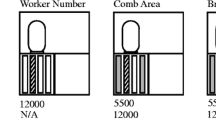Abstract
Three experiments were conducted to explore the effects of severe food shortage on the control of two important and interrelated aspects of temporal division of labor in colonies of the honey bee (Apis mellifera): the size and age distribution of a colony's foraging force. The experiments were conducted with single-cohort colonies, composed entirely of young bees, allowing us to quickly distinguish the development of new (precocious) foragers from increases in activity of bees already competent to forage. In experiment 1, colony food shortage caused an acceleration of behavioral development; a significantly greater proportion of bees from starved colonies than from fed colonies became precocious foragers, and at significantly younger ages. Temporal aspects of this starvation effect were further explored in experiment 2 by feeding colonies that we initially starved, and starving colonies that we initially fed. There was a significant decrease in the number of new foragers in starved colonies that were fed, detected 1 day after feeding. There also was a significant increase in the number of new foragers in fed colonies that were starved, but only after a 2-day lag. These results suggest that colony nutritional status does affect long-term behavioral development, rather than only modulate the activity of bees already competent to forage. In experiment 3, we uncoupled the nutritional status of a colony from that of the individual colony members. The behavior of fed individuals in starved colonies was indistinguishable from that of bees in fed colonies, but significantly different from that of bees in starved colonies, in terms of both the number and age distribution of foragers. These results demonstrate that effects of starvation on temporal polyethism are not mediated by the most obvious possible worker-nest interaction: a direct interaction with colony food stores. This is consistent with previous findings suggesting the importance of worker-worker interactions in the regulation of temporal polyethism in honey bees as well as other social insects.
Similar content being viewed by others

Author information
Authors and Affiliations
Additional information
Received: 17 April 1997 / Accepted after revision: 26 December 1997
Rights and permissions
About this article
Cite this article
Schulz, D., Huang, ZY. & Robinson, G. Effects of colony food shortage on behavioral development in honey bees. Behav Ecol Sociobiol 42, 295–303 (1998). https://doi.org/10.1007/s002650050442
Issue Date:
DOI: https://doi.org/10.1007/s002650050442



